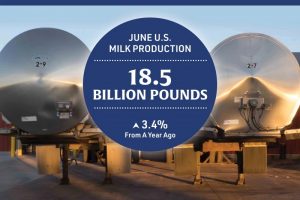
Businesses within both the plant-based and the dairy sectors have submitted comments to the US Food and Drug Administration (FDA)’s proposed labelling guidance for plant-based milk alternatives.
The proposed guidance focuses on consumer awareness of the nutritional differences between plant-based milk alternatives and traditional dairy milk.
It recommends that plant-based milk alternatives that use the term “milk” in their name, and have a different nutrient composition to dairy milk, bear a voluntary nutrient statement on the product label detailing the nutritional differences – for example, a statement could read “contains lower amounts of calcium than milk”.
Over 900 comments have been submitted in response to the guidance, which recommends that the industry uses the USDA’s Food and Nutrition Service fluid milk substitutes nutrient criteria to assess plant-based milk alternatives’ nutritional profile in comparison to milk.
The Vegetarian Resource Group stated that while it welcomed some of the FDA’s recommendations – for example, accurately conveying the blend of plant sources used in development of milk alternative products – the organisation believes that the nutritional statement recommendation would be “overly burdensome” to manufacturers and does not take into consideration the total diet.
The organisation commented: “Plant-based milk alternatives, as do all other products, have a Nutrition Facts label that compares important nutrients to the Daily Value. This allows consumers to assess the nutritional quality of a product. It seems unnecessary to include an additional comparison.”
“Manufacturers are not encouraged to include statements such as ‘contains a lower amount of fibre than plant-based burgers’ on a package of ground beef patties or ‘contains a lower amount of iron than soy milk’ on a carton of dairy milk. We do not think it is necessary nor appropriate to recommend that plant-based milk alternatives include an additional statement on their package comparing them to dairy milk.”
The Almond Alliance stated that it recognises that various plant-based milk alternatives may differ from dairy products across a number of nutrients, but questioned whether using the USDA’s FNS fluid milk substitutes chart would be the most effective way of informing consumers.
“The Dietary Guidelines for Americans, 2020-25 clearly identified calcium, vitamin D and potassium as nutrients of public health significance. Fortified almond milk maintains an overall nutritional content similar to dairy milk, providing calcium, potassium and vitamin D,” Almond Alliance said.
“Focusing only on DGA-identified nutrients of public health concern (i.e. Calcium, Vitamin D) provides consistency and clarity to the consumer to head-to-head compare products, while ensuring a good source of these nutrients across all products.”
The Plant Based Foods Association (PBFA), which currently represents over 200 plant-based food companies in the US, also commented, affirming that plant-based food products should be regulated “in a manner consistent with the regulation of other food products”.
It welcomed the FDA’s re-affirmation of its position that the term “milk” may be used in the names of plant-based milks so long as such use is not misleading.
“This has been the FDA’s position for decades, but nevertheless, we are glad the FDA has confirmed that it applies to plant-based milks. We also appreciate the FDA’s recognition that plant-based milks do not purport to be, nor are they represented as cow’s milk,” the PBFA said.
However, the PBFA said it was concerned by the FDA’s recommendations around an additional nutritional statement, and the recommendation that plant-based milks include in their statement of identity a description of the nature or source of the predominant ingredient in the product.
“The Nutrient Disclaimers and Naming Obligations are entirely without precedent and are inconsistent with existing regulation and guidance,” the association argued.
“They single out plant-based milks, regulate them unlike any other food product in the marketplace, and would effectively dissuade them from labelling with the term ‘milk’. In fact, they protect the dairy industry at the expense of its growing plant-based competition.”
The PBFA said the USDA’s nutrient criteria does not align to the diverse dietary patterns of the general population, and disregards that there are many other widely available sources of these nutrients beyond cow’s milk, for example, magnesium being widely available in leafy greens, legumes, nuts, seeds and whole grains.
Dairy giant Danone North America, which also includes a number of plant-based products in its portfolio, commented that its diverse range of offerings enables it a unique position to understand and meet evolving consumer needs and preferences.
“We agree that an appropriate statement of identity could include the primary base or base-blend, but recommend clarifying that companies have flexibility to use a common or usual name or appropriately descriptive term in accordance with FDA regulations, particularly for more complex blends and innovations,” Danone North America stated.
The company also argued that the front-of-pack nutrient comparison is unnecessary, inconsistent with existing FDA regulations and will “overcrowd” the label, conflicting with other messaging and resulting in more consumer confusion.
Other organisations within the dairy sector, however, have argued that the recommendations do not go far enough to reduce consumer confusion, calling for more stringent requirements.
Arla Food Ingredients and Dairy Farmers of America were among these, arguing that the FDA should rethink its stance on allowing the use of the term “milk” in the labelling of plant-based alternatives.
“Consumers are confused by the misuse of the word ‘milk’ on imitation beverages. They should not be misled into associating the nutritional profile of cow’s milk, that is packed with 13 essential nutrients for growth including calcium, potassium and protein, to the inferior nutritional content of these imitation products,” Dairy Farmers of America commented in its statement.
Meanwhile, Arla argued that consumers perceive plant-based milk alternatives to have a better nutritional profile when the term “milk” is used compared to terms like “drink” and “beverage,” and that the voluntary nature of the proposed nutritional statement would be “of great risk”.
“In summary, we understand that the use of the term “milk” in plant-based milk alternatives is misleading for the consumers and might lead to potential public health concerns for the US population. Moreover, we believe that the voluntary nutrient statement is an insufficient response to the presented health concern and would not be an effective tool to reduce consumer misunderstanding,” Arla concluded.























